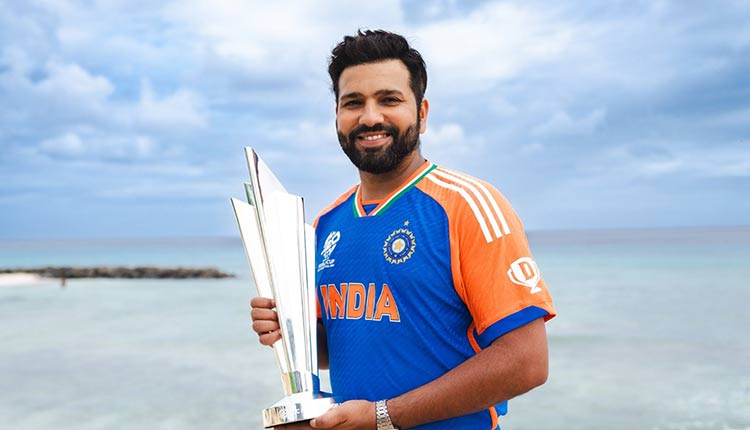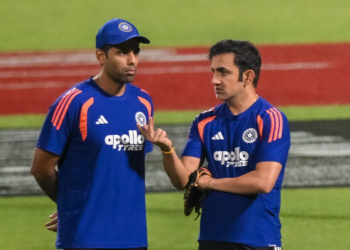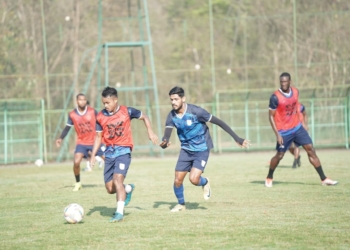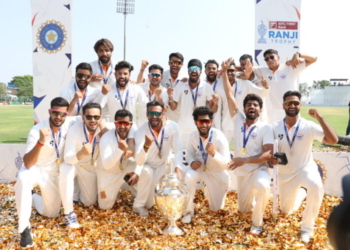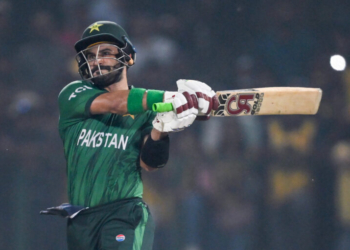New Delhi: June 29, 2024 will be forever remembered as the day India ended its 13-year drought of a World Cup win when the Rohit Sharma-led side beat South Africa by seven runs to lift the Men’s T20 World Cup at the Kensington Oval.
A young Rohit was a member of the 2007 T20 World Cup winning side in South Africa and Saturday’s triumph at Barbados saw him lift the trophy and sign off from the format as the leader of the pack.
Through its attacking batting template and bowlers clicking in unison coupled with sufficient depth, India now holds the distinction of being the first team to win the T20 World Cup without losing a single match through the competition.
Lalchand Rajput, the manager of the Indian team winning 2007 T20 World Cup, speaks exclusively to IANS on the 2024 triumphant campaign, the legacy which Rohit and Virat Kohli leave behind, as well as Jasprit Bumrah and Hardik Pandya playing major roles in the victorious run, and more.
Excerpts:
Q. What are your immediate thoughts around this T20 World Cup triumph & what does this mean for Indian cricket?
A. Everybody is very excited and we have got the cup again after a long time, so it’s very exciting. The first time we won in 2007, it meant a lot. The IPL started after that, and we can see that through the IPL, a lot of players are playing T20s. We are getting a very good bench strength. If you look at our team, we can have two or three teams together because the talent is so much. So, this World Cup win definitely inspires young players to take up this game more.
Q. Rohit Sharma was a member of the team which won the 2007 edition and now he’s the winning captain in 2024. How do you see this legacy of him ending the trophy drought for India and now calling it quits from the format?
A. It’s been a long journey for Rohit. To be very honest, he was talented and that’s why we picked him in 2007. He played a good inning in the final as well, where he got upto 30 and got to taste the win of a World Cup. So, this time, he wanted to win very badly as a captain and for which he got his reward. The brand of cricket he played, that was very important.
He made the team to believe in themselves, and to play in a template where they can express themselves. It was phenomenal to see that the hunger to win was there, not only in one or two guys, but it was present in the whole team. He has left a very big legacy in T20Is, and to be very honest, it will be defined by the brand of cricket he played.
Even in last year’s ODI World Cup, the way he used to give start to the team all the time and take on the best bowlers, that legacy of him will always be there. It will be difficult for someone to fill in the shoes of someone as huge as him in the near future. But definitely, over a period of time, there might be a new person to fill in for Rohit.
Q. Virat Kohli has also played his last T20I for India, which he ends as a player of the match in the final. A word on him and his impact in the shortest format for India.
A. He never had a good tournament, to be very honest, except the final. And people started talking about his strike rate, whether he should be there in the team and everything. But he’s one of the best players we ever had. He is a great cricketer, and if you look at the Indian team, the resurgence of it was done by him when he was the captain.
He always likes to win, and is a big occasion player. When there is a big platform, he performs. Rightly on the final day when India needed the most, after we lost two-three wickets, he stood like a solid rock, and made sure that the team reached a decent score. The par score was 160, but we had just 10-15 runs more than it and that made the difference of winning the championship.
Q. Jasprit Bumrah has had a dream time in this competition to be Player of the Tournament. How do you assess his wonderful campaign?
A. He is a world-class bowler and whenever Bumrah is in the team, the captain is relaxed because he can use him anytime – in the first power play, middle overs, and the death overs. When you need a wicket, the captain can call him and he obliges by taking the wicket. In the final, the equation read as 30 runs off 30 balls.
When he came back in the final, he got a wicket in his final over and that put the pressure on the other batters. He makes such a difference in the game, which is why he became the player of the tournament. Bumrah is a lethal weapon for any captain who gets a player like him in his team.
If he had played in the 2022 Adelaide semi-final, it would not have been the same story. We missed him very badly last time in the World Cup due to injury. But this time Bumrah made a huge difference. I know everybody has contributed to the team’s cause. But Bumrah is a special person in the team who delivers impactful performances on special occasions.
When you need a wicket very badly, he will come and give you that breakthrough. If there’s a partnership to break, call Bumrah and he will get it. If they need 10 runs, call Bumrah and he will give 6 runs. He can bowl good yorkers, short balls and mixes up his bowling to be a lethal wicket-taker.
You can also see that when Bumrah was playing alongside Arshdeep Singh, the youngster became a very changed bowler. So, he really motivates the other bowlers, as he and Arshdeep hunted in pairs as a bowling partnership.
When Bumrah bowls well, he makes sure that the other bowler also bowls well. He talks to them, gives them his ideas on what to bowl, what the batter is doing, and what you should bowl on this type of wicket, and he’s simply the icon of bowling.
Q. Another interesting narrative has been Hardik Pandya performing his all-rounder roles with aplomb after a lacklustre IPL. What does this tell about his mindset of coming good at a big event?
A. Pandya’s performance shows the character of him as a player because he was going through a lot of problems during the IPL and in his personal life as well. He never had a good tournament. But to step up in a World Cup, especially in the final, and to take that responsibility or onus to bowl the last over and make India win because it could have been anybody’s game, that speaks for itself.
See, nowadays, making 15-16 in the last over is not that difficult. But he bowled really well and that shows the character of that person. It also means that Hardik is a very, very strong-headed person.
Q. Axar Patel and Shivam Dube also played vital roles with the bat in the final. A word on their quick contributions in the title clash.
A. Axar was sent up to take on the left-arm spinners Tabraiz Shamsi and Keshav Maharaj. His 47 runs were very, very crucial because at that time, the spinners were bowling and then we had lost two wickets, but Virat was at the other end. He had to take that initiative and a match-up against a left-arm spinner made a big difference in the team’s total as well.
Shivam Dube has always been a very good striker of the ball, and we have seen him in the IPL, against spinners, he murders them with his big-hitting and then against fast bowlers, he takes them on. His quick-fire 27 was the difference in India getting 150-160 and making 177.
Q. How heartwarming was it to see Rahul Dravid sign off from his coaching stint on a high?
A. Every coach would like to go out on a high and we all know Rahul Dravid, how he’s very dedicated as a player and person. When he played, he was the wall of Indian cricket. Now as a coach, he has been around for so many years and narrowly missed the 50-over World Cup.
So, this triumph was a big thing that he achieved in his last game as a coach. I think God has been very, very kind to him that the players gave him a very good gift, and it could not be much better than winning the World Cup.
Q. When the equation came down to 30 runs off 30 balls to decide the winner, what was going through your mind?
A. With South Africa having that tag of chokers around, I felt if big wickets fall in the last five overs, it will be over for them, and that’s what happened. India had been in that place for a number of years, but for South Africa, it was the first time they were in the finals, and had that tag of faltering at a crucial time.
In cricket, getting 30 runs in 30 balls with five or six wickets in hand is easy. After Klaassen and Jansen wickets, it felt over for South Africa. After Bumrah took out Jansen in that excellent over, Arshdeep’s 19th over was really crucial and people forget about that. If he had given 15-20 runs, then the match would have gone.
Also, in the last over, David Miller was one who could get 20 runs in one over. But catches win you big games in the World Cup, and Suryakumar showed a very good presence of mind running in because he was getting his balance outside the boundary line. But he had the presence of mind to make sure that he threw the ball up, came back in and caught it, which further became the difference in winning and losing.
Q. Seeing the jubilant scenes in Barbados must have reminded you of similar scenes at Johannesburg in 2007. Can you talk about experiencing that winning feeling in 2007?
A. I think you cannot describe that feeling to be very honest, because when you think of it, you get goosebumps. It was a very special feeling. First time we were playing the T20s. No one had much experience of playing T20. Now, every team has been playing for the last 17 years – T20s and IPL.
So they all have got the experience, but at that time, getting into a tournament for the first time, never had any match before and just one game before that World Cup. To then be winning the tournament was a dream come true for all of us. Again, it was a close game, and here also, it was a close game because in T20s, either you win very convincingly or otherwise it will be a close game. So, it really tests your nerves as well.
That time you feel that we have conquered the world. There is no one there now and we are on top of the world. That feeling of winning the World Cup, cannot be described in any way and its’ something different. When you win that, you do something which you have not seen before as you are over the moon at that time.
Like after winning the World Cup, you would never have seen Rahul Dravid being so animated. That celebration in Mumbai is still very much etched in our memory. We never expected that Mumbai would be at a standstill. I hope they get the same ovation here now. I don’t know how they are going to do it, but that celebration was something special when we won for the first time. Now, this one is also very special.




